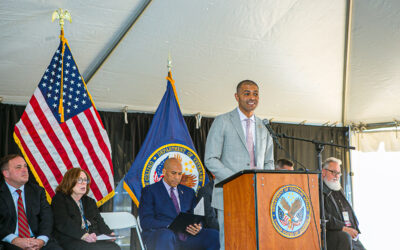As the veteran population ages and healthcare options expand, it might be beneficial for the VHA to reassess how it evaluates hospital performance, a new study suggested.
Happiness Levels in U.S. Military Veterans Similar to General Population
Overall, U.S. military veterans report happiness levels that are only slightly lower than the general population, despite potentially traumatic experiences during deployment.
Issues Weren’t That Different in VA 60 Years Ago
With news every day about VA staffing cuts, the cancellation of contracts and, essentially, the way the agency does business, it is interesting to look back to what might seem to us as a simpler time – 60 years ago, when U.S. Medicine began.
VA Urged to Avoid Large Monolithic IT Projects, Use a More Modular Approach
Legislators, agency watchdogs and VA leaders are in agreement: The department must stop investing in massive, multiyear IT projects whose intention is to solve a technology need in one fell swoop.
VA EHR Rollout Will Resume in 2026 at Several Michigan Sites
VA has announced that it is planning to restart the rollout of its electronic healthcare record modernization project in mid-2026, starting with four facilities in Michigan—Ann Arbor, Detroit, Battle Creek and Saginaw.
Payer Shift From Medicare Meant Extra $2 Billion VA Emergency Care Costs
At least $2 billion of VA spending for community emergency department care in 2021 was due to a payer shift from Medicare, according to a recent research letter.
VA Insists That Extra $6.6 Billion Still Needed; Inflation Driving Up Costs of Drugs, Prosthetics
At a public examination of VA’s ongoing budget crisis, Republican legislators accused agency leaders of general incompetence and of using the budget as political leverage during an election season.
VA Accused of Not Keeping Up with a More Active Amputee Patient Population
While VA has long considered itself a provider of world-class prosthetics care, younger veterans are reporting that the department has yet to adapt to a more active patient population.
Why Hasn’t More Community Care Improved Veteran Mortality Rates?
In 2014, Congress enacted the Choice Act, followed by the MISSION Act in 2018. Introduced in response to concerns that delays in receiving VA care were negatively impacting veterans, these legislations were designed to simplify the process for veterans to access VA-purchased care.
Nearly $15 Billion Budget Shortfall Must Be Addressed This Month, VA Officials Said
Congress recessed for August without passing legislation to close the nearly $15 billion budget shortfall VA is facing for this year and next. The shortfall, which came to light in July, includes $2.88 billion for the remainder of FY2024 and $12 billion for FY2025.
VA EHR Rollout at Lovell Federal Healthcare Center Better Than Previous Sites, But Legislators Say Some Issues Persist
About six months ago, the James A. Lovell Federal Healthcare Center became the sixth VA site to switch to the Oracle-Cerner electronic health record (EHR).
Legislators Question Continued Usefulness of VISN System at VA
The Veterans Integrated Service Networks (VISNs), which group VA’s facilities into 18 interconnected regions, has been a key part of the department’s structure since they were created in the late 1990s. Now, following a series of key oversight failures at VA facilities and years of watchdog agencies reporting frustrating inconsistencies from VISN to VISN, legislators are wondering if this structure is really the best way to oversee VA’s 172 hospitals nationwide.
Fewer Deaths After Serious Illness in Veterans Treated With PARC Care Model
After a serious illness, veterans who received medical care via the Post-Acute Recovery Center (PARC) model experienced fewer deaths and more days outside of the hospital compared to those not treated with PARC, according to a recent study.
VA Resource Crunch Less Than Feared With PACT Act-Related Enrollment Surge
The VA is experiencing less of a resource crunch this year due to the PACT Act-related surge than previously expected, according to VA Secretary Denis McDonough. He gave the credit to early planning and increased hiring.
Women Veterans Receiving Surgery at the VHA Have Half the Risk of Mortality
Only 11% of U.S. military veterans are women, according to recent statistics, and they make up even a smaller percentage of patients using VA healthcare—about 10%.
VA Seeks ‘Maintenance Budget’ After Record Growth in Enrollment, Hiring
While VA’s proposed budget represents a 10% increase from last year, it includes decreases in key areas like hiring and infrastructure.
Does ‘Underserved’ Designation Demoralize Staff at VA Facilities?
For the past several years, VA has been identifying the most underserved facilities in its system and requiring them to create action plans to improve care to their veterans.
Opposing Trends for Accidental Death Rates in Returning Soldiers
A longitudinal cohort study, published in the Annals of Epidemiology, determined if risk for accidental death overall, or the most common types of accidental deaths, varied over time in relation to when a soldier returned from a combat deployment.
VA Healthcare Found to Generally Be More Efficient Than Private Care
Several recent studies have shown that VA healthcare is consistently as good as—or better than—non-VA healthcare. Now a study shows VA healthcare is also more efficient.
Military Healthcare Beneficiaries Have Better NSCLS Survival.
Does the universal healthcare provided by the U.S. military health system (MHS) mean better lung cancer survival for patients? A new study suggested that is the case.
VA Trying to Pick Up Slack for Rural Veterans Losing Community Healthcare
VA has long struggled to provide care to veterans in rural areas of the country. Veterans living there are frequently required to drive long distances to VA hospitals, and smaller VA clinics are not always available.
Nearly 20% of Veterans Showed Decline During Pandemic
While most U.S. veterans maintained or improved physical and mental function a year into the COVID-19 pandemic, almost 20% showed a decline, according to a new study.
VA Healthcare, Fourth Mission Face Stresses From Continued Climate Change
With a worsening climate crisis, VA expects to be called upon more and more to implement its fourth mission—to act as a backstop for the nation’s overall healthcare network during times of emergency.
Veterans Treated in VAMCs for Some Common Conditions Had Better Outcomes
Outcomes were better for some common conditions among veterans treated in VA hospitals compared to community care, but the tradeoff often was higher resource use.
MHS Patients Receive Earlier Diagnoses for Colorectal, Other Cancers
Military Health System patients tend to receive earlier diagnoses of colon cancer and other types of malignancies than members of the general U.S. population covered by insurance, especially Medicaid.
DHA Restructures, Creating Nine Health Networks to Improve Care
In the first phase of a broader realignment, the Defense Health Agency has created nine Defense Health Networks (DHN) to take the place of what had been 20 direct-reporting medical markets, each a grouping of military hospitals and clinics with varying leadership rank structures.
Concerns Raised About ‘Buggy’ Website; VA’s Dependence on It
VA’s main website, va.gov, and several of its support systems have been the victim of bugs that have caused tens of thousands of VA benefits claims to go unprocessed.
Army Names Kenney and Petty Best Medics for 2023
Anyone with a 68W military occupation specialty signs up to go above and beyond the call of duty as a matter of course. As combat medic specialists, they provide life-saving treatment in the chaos and trauma of battle and accept responsibility for the health and well-being of their fellow soldiers on base.
Five Facilities Where New Cerner EHR Is Live Face Continuing Issues
As VA approaches the 3-year anniversary of the Cerner electronic health record system going live at its first site, the roll-out remains on indefinite hold as the department endeavors to fix problems at the five facilities where the system is active.
New Journal Article Decries Lack of Recognition for Military Medicine
A new Special Communication in JAMA Network Open decried that military medicine’s contribution to healthcare advances often are overlooked and that not enough communication occurs between civilian and military clinicians.














